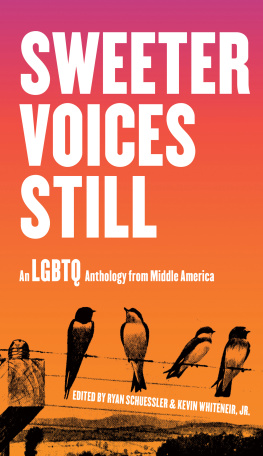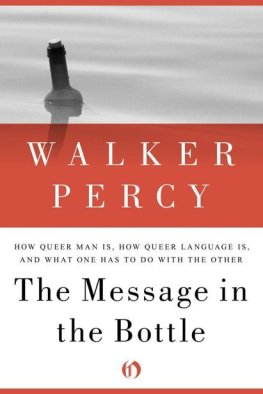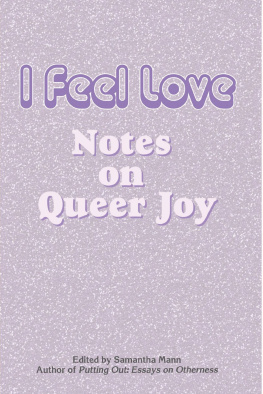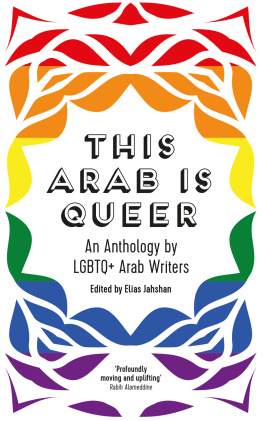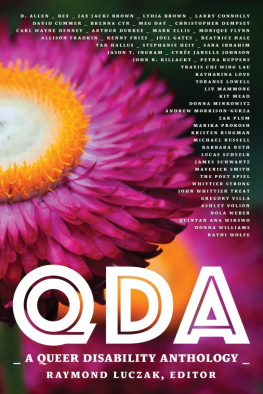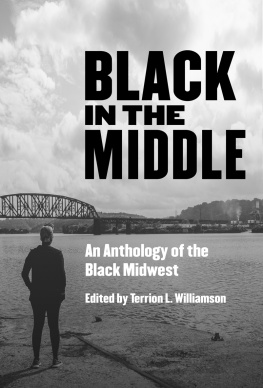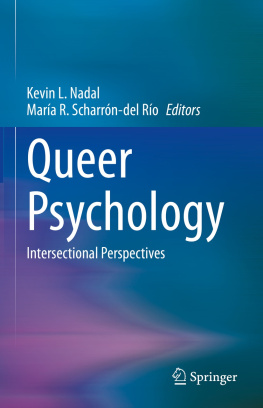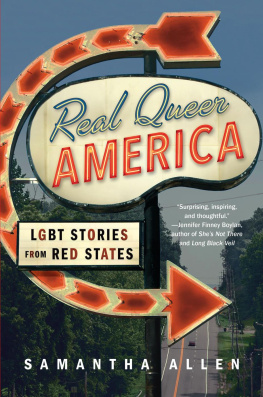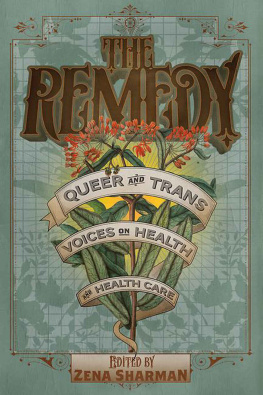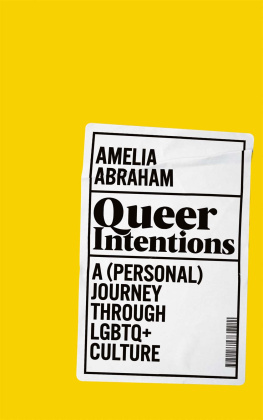
SWEETER VOICES STILL
An LGBTQ Anthology from Middle America
SWEETER VOICES STILL
An LGBTQ Anthology from Middle America
EDITED BY RYAN SCHUESSLER & KEVIN WHITENEIR, JR.

Copyright 2020, Belt Publishing
All rights reserved. This book or any portion thereof may not be reproduced or used in any manner whatsoever without the express written permission of the publisher except for the use of brief quotations in a book review.
First Edition 2020
ISBN: 9781948742818

Belt Publishing
5322 Fleet Avenue, Cleveland, OH 44105
www.beltpublishing.com
Book design by Meredith Pangrace
Cover by David Wilson
CONTENTS
Doug Kiel
Ryan Schuessler and Kevin Whiteneir, Jr.
Kai Minosh Pyle
Evan Williams
Aaron K. Foley
Dominick Duda
Kemi Alabi
Stacy Jane Grover
Joanna Eleftheriou
Gabrielle Montesanti
Jennifer Morales
Mary Maxfield
Owen Keehnen
River Ian Kerstetter
Sarah Sala
Jessica Jacobs
Taylor Brorby
Evan Williams
Samuel Autman
Carmen Smith
Steffan Triplett
Jessie Keary
Evan Williams
Robert L. Patrick
James Schwartz
Alyson Thompson
Angela Pupino
Andriy Partykevich
Carmen Smith
Jessie Keary
Kai Minosh Pyle
Jeffery Beam
Jos Quiones
Zach Benak
Yasmin Bashir
Neema Avashia
River Coello
Alyson Thompson
CJ Janovy
Gregg Shapiro
Edward M. Cohen
Joel Showalter
Gene Dawson
Elizabeth Harper
Christopher Gonzalez
Dominick Duda
Raymond Luczak
Lars Avis
Jocelyn Krueger
Kalene Nisly
Jackie Hedeman
Harmony Cox
Joss Barton
Elizabeth Harper
Robyn Steely
Anonymous
Ka Oskar Ly
K. Ann MacNeil
Sylvia Sukop
Brian Czyzyk
L.S. Quinn
Kay Patterson
Nichole Lohrman-Novak and Janine Tiffe
Sharon Seithel
Jeffery Beam
Michael Schreiber
James Schwartz
Anonymous
April Vazquez
Samer Hassan Saleh
Jennifer Morales
Patrick Del Percio
Jasmine Burnett
FOREWORD
Queer Heartlands
DOUG KIEL
The Midwest and Appalachia are both routinely identified as parts of the American heartland. What heartland means, however, is more than a little murky. Typically the phrase is used as a shorthand, quite often by politicians, to evoke images of small towns and white cisgender men and women laboring in factories and farms throughout the vast U.S. interior. In the popular imagination, the heartland is where real America can be found, where its traditional values and institutions are most cherished.
Garrison Keillor made a decades-long career out of satirizing, and often reinforcing, these one-dimensional perceptions in his writing and nationally-syndicated radio program, A Prairie Home Companion (19742016). In each radio broadcast, Keillor described his fictional setting of Lake Wobegon, Minnesota, as a place where all the women are strong, all the men are good-looking, and all the children are above average. Keillors folksy caricature draws from a widely held notion that the heartland is defined by plain uniformity, the absence of difference. There are no LGBTQ people at Lake Wobegon.
It may seem a contradiction to be queer in a place that is so heavily mythologized as the epitome of normaland implicitly, straight and whiteAmerican life. Sweeter Voices Still reveals the heartlands as they truly are: rich with queer human experience. They always have been, as Kai Minosh Pyle shows in their opening piece, The Midwest is a Two-Spirit Place. From an Indigenous perspective, it is European ideas about gender and sexuality, steeped in Abrahamic religion, that are historically queer in the lands now known as the United States.
As many of the authors in this volume attest to, LGBTQ people in Middle America have often been made to feel out-of-place, like they dont belong in the region. The prairie wasnt the place for boys who liked boys, writes Taylor Brorby in his piece, Boys and Oil. Stacy Jane Grovers Lancaster is Burning speaks to a similarly conflicted relationship to her home. After coming out as transgender, she notes, I struggled, wishing to be a country woman, of the land rather than being forced into exile. SweeterVoices Still is an act of queer worldmaking; it makes an important contribution to changing how the American heartlands are represented, signaling that it is possible for LGBTQ people to thrive in the flyover states.
Throughout these pages, the authors bring the landscape to life, share memories of formative moments, and revisit the spaces that hold them. In stories and poems that span generations, readers are taken to piers in Michigan, a hunters tree stand, fairgrounds on Independence Day, a dark stairwell where men cruise for sex, and bars that serve as an oasis of queer community, where the release of music and dancing can heal. Owen Keehnen writes of one such place, Irenes Cabaret along the Mississippi River in Quincy, Illinois, that for 36 years was a melting pot of drag queens, leathermen, hustlers, lesbian farmers, bi-curious spouses, coeds, etc. Sweeter Voices Still highlights that not only do LGBTQ people belong in the heartland, but also they have long created safe spaces for each other, developing alternative forms of kinship.
The need for many LGBTQ people to seek out new, chosen families is underscored by testimonies in this anthology that detail struggles for acceptance in ones family of origin. Home can be haunting. Childhood memories about fathers and fragile masculinity loom large in this collection. As LGBTQ children begin to discover who they are and transcend social norms about dress and behavior, some fathers intervene to strictly reinforce binary gender roles, sometimes with violence and shame. Many, but certainly not all, of the mothers in these stories play a very different role as an important lifeline. In small but consequential moments that are captured in these pages, mothers are frequently a source of comfort, even a voice that gently hints its OK if you have a secret. For some, particularly from earlier generations, open secrets about sexuality could go unacknowledged by families for an entire lifetime. In A Tale of Three Seasons: Black Midwestern Lesbian Lineages, Jasmine Burnett writes about her great Aunt Betty, born in 1931. My Aunt Betty never officially came out, Burnett notes, she simply lived and allowed you to arrive at your own decisions about how you thought she was living her life.
Throughout this book, the fear of judgement by God and family are among the most powerful forces keeping LGBTQ heartlanders silent and in the closet. This is particularly true for the most devout. Andriy Partykevich, for instance, writes in Vichna Pamyat about his journey into the priesthood of the Ukrainian Orthodox church, while also coming to understand his sexuality. I knew I was gay, God knew I was gay, but the Church could not or must not, Partykevich writes. Similarly, in Letter to the Prodigal Son, an anonymous author from Amish Country writes about admiring the courage of another gay man who left the community to live his truth. He eventually returned, however, and the anonymous author notes, I brushed away tears, for I hoped you could make it out there. Partykevich held onto his own secret through more than 20 years of service to the church, but did ultimately leave the priesthood and married a man. Partykevich expresses deep regret, seeking forgiveness from his late father for having never come out while he was alive. Sometimes the struggle is to accept oneself; as the anonymous Amish author asserts so poignantly, because our people wont forgive us, we must forgive ourselves.
Next page
